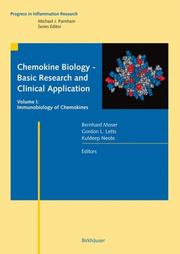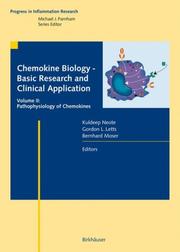| Listing 1 - 6 of 6 |
Sort by
|

ISBN: 376436825X 9786610608805 1280608803 3764374233 Year: 2006 Publisher: Basel ; Boston : Birkhauser,
Abstract | Keywords | Export | Availability | Bookmark
 Loading...
Loading...Choose an application
- Reference Manager
- EndNote
- RefWorks (Direct export to RefWorks)
The discovery of interleukin-8 close to 20 years ago initiated a new field of research touching on many aspects of immunology and inflammation. Interleukin-8 is just one member of a large class of structurally related chemoattractant proteins, known as chemokines. Chemokines are involved in the traffic control of leukocytes, which bear the corresponding chemokine receptors on their surfaces. Today, it is clear that chemokines affect all aspects of immunology and even many unrelated fields, such as tissue development and tumor cell metastasis. Their fundamental contributions to chronic inflammatory diseases make them a principal target for the development of novel, anti-inflammatory therapeutics. This set of books* gives a state-of-the-art account of recent developments in this field in the form of summaries written by highly regarded experts. Volume I is focused on basic principles and progress in chemokine biology, and Volume II deals with issues related to chemokine-related drug development and potential therapeutic applications. These volumes provide both introductory and novel information for a broad readership, including clinicians and biomedical scientists. *See also K. Neote/G.L. Letts/B. Moser, Chemokine Biology - Basic Research and Clinical Application. Volume II: Pathophysiology of Chemokines. 2006, Birkhäuser, Progress in Inflammation Research, ISBN 3-7643-7195-1.
Chemokines. --- Biology --- Health & Biological Sciences --- Microbiology & Immunology --- Immunology. --- Immunobiology --- Chemotactic cytokines --- Inflammatory peptides --- Intercrines --- Medicine. --- Pharmacology. --- Cell biology. --- Biomedicine. --- Pharmacology/Toxicology. --- Cell Biology. --- Life sciences --- Serology --- Cytokines --- Inflammation --- Peptides --- Mediators --- Toxicology. --- Cytology. --- Cell biology --- Cellular biology --- Cells --- Cytologists --- Chemicals --- Medicine --- Pharmacology --- Poisoning --- Poisons --- Toxicology --- Drug effects --- Medical pharmacology --- Medical sciences --- Chemotherapy --- Drugs --- Pharmacy --- Physiological effect

ISBN: 3764371951 9786610969883 1280969881 3764374373 Year: 2006 Publisher: Basel ; Boston : Birkhauser,
Abstract | Keywords | Export | Availability | Bookmark
 Loading...
Loading...Choose an application
- Reference Manager
- EndNote
- RefWorks (Direct export to RefWorks)
Chemokines play an important role in recruiting inflammatory cells into tissues in response to infection and inflammation. They also play an important role in coordinating the movement of T-cells, B-cells and dentritic cells, necessary to generate an immune response (response to injury, allergens, antigens, invading microorganisms). They selectively attract leukocytes to inflammatory foci, inducing both cell migration and activation. They are involved in various diseases, like atherosclerosis, lung and skin inflammation, multiple sclerosis, or HIV. Volume 2 of this two-volume set discusses the pathophysiology of chemokines. It is divided into two parts: a) chemokines in animal disease models, and b) chemokines as drug targets. Together with volume 1, which discusses the immunobiology of chemokines, both volumes give a comprehensive overview of chemokine biology.
Chemokines. --- Receptors, Chemokine. --- Biology --- Health & Biological Sciences --- Microbiology & Immunology --- Medicine. --- Immunology. --- Pharmacology. --- Cell biology. --- Biomedicine. --- Pharmacology/Toxicology. --- Cell Biology. --- Cell biology --- Cellular biology --- Cells --- Cytologists --- Drug effects --- Medical pharmacology --- Medical sciences --- Chemicals --- Chemotherapy --- Drugs --- Pharmacy --- Immunobiology --- Life sciences --- Serology --- Clinical sciences --- Medical profession --- Human biology --- Pathology --- Physicians --- Physiological effect --- Toxicology. --- Cytology. --- Medicine --- Pharmacology --- Poisoning --- Poisons --- Toxicology
Digital
ISBN: 9783764374235 Year: 2006 Publisher: Basel Birkhäuser Verlag
Abstract | Keywords | Export | Availability | Bookmark
 Loading...
Loading...Choose an application
- Reference Manager
- EndNote
- RefWorks (Direct export to RefWorks)
Histology. Cytology --- Immunology. Immunopathology --- Pharmacology. Therapy --- immunologie --- farmacologie --- toxicologie --- cytologie --- histologie
Digital
ISBN: 9783764374372 Year: 2007 Publisher: Basel Birkhäuser Verlag AG
Abstract | Keywords | Export | Availability | Bookmark
 Loading...
Loading...Choose an application
- Reference Manager
- EndNote
- RefWorks (Direct export to RefWorks)
Histology. Cytology --- Immunology. Immunopathology --- Pharmacology. Therapy --- immunologie --- farmacologie --- toxicologie --- cytologie --- histologie

ISBN: 9783764368258 9783764374235 Year: 2006 Publisher: Basel Birkhäuser Verlag
Abstract | Keywords | Export | Availability | Bookmark
 Loading...
Loading...Choose an application
- Reference Manager
- EndNote
- RefWorks (Direct export to RefWorks)
The discovery of interleukin-8 close to 20 years ago initiated a new field of research touching on many aspects of immunology and inflammation. Interleukin-8 is just one member of a large class of structurally related chemoattractant proteins, known as chemokines. Chemokines are involved in the traffic control of leukocytes, which bear the corresponding chemokine receptors on their surfaces. Today, it is clear that chemokines affect all aspects of immunology and even many unrelated fields, such as tissue development and tumor cell metastasis. Their fundamental contributions to chronic inflammatory diseases make them a principal target for the development of novel, anti-inflammatory therapeutics. This set of books* gives a state-of-the-art account of recent developments in this field in the form of summaries written by highly regarded experts. Volume I is focused on basic principles and progress in chemokine biology, and Volume II deals with issues related to chemokine-related drug development and potential therapeutic applications. These volumes provide both introductory and novel information for a broad readership, including clinicians and biomedical scientists. *See also K. Neote/G.L. Letts/B. Moser, Chemokine Biology - Basic Research and Clinical Application. Volume II: Pathophysiology of Chemokines. 2006, Birkhäuser, Progress in Inflammation Research, ISBN 3-7643-7195-1.
Book
ISBN: 9783764374372 Year: 2007 Publisher: Basel Birkhäuser Verlag AG
Abstract | Keywords | Export | Availability | Bookmark
 Loading...
Loading...Choose an application
- Reference Manager
- EndNote
- RefWorks (Direct export to RefWorks)
Chemokines play an important role in recruiting inflammatory cells into tissues in response to infection and inflammation. They also play an important role in coordinating the movement of T-cells, B-cells and dentritic cells, necessary to generate an immune response (response to injury, allergens, antigens, invading microorganisms). They selectively attract leukocytes to inflammatory foci, inducing both cell migration and activation. They are involved in various diseases, like atherosclerosis, lung and skin inflammation, multiple sclerosis, or HIV. Volume 2 of this two-volume set discusses the pathophysiology of chemokines. It is divided into two parts: a) chemokines in animal disease models, and b) chemokines as drug targets. Together with volume 1, which discusses the immunobiology of chemokines, both volumes give a comprehensive overview of chemokine biology.
Histology. Cytology --- Immunology. Immunopathology --- Pharmacology. Therapy --- immunologie --- farmacologie --- toxicologie --- cytologie --- histologie
| Listing 1 - 6 of 6 |
Sort by
|

 Search
Search Feedback
Feedback About UniCat
About UniCat  Help
Help News
News